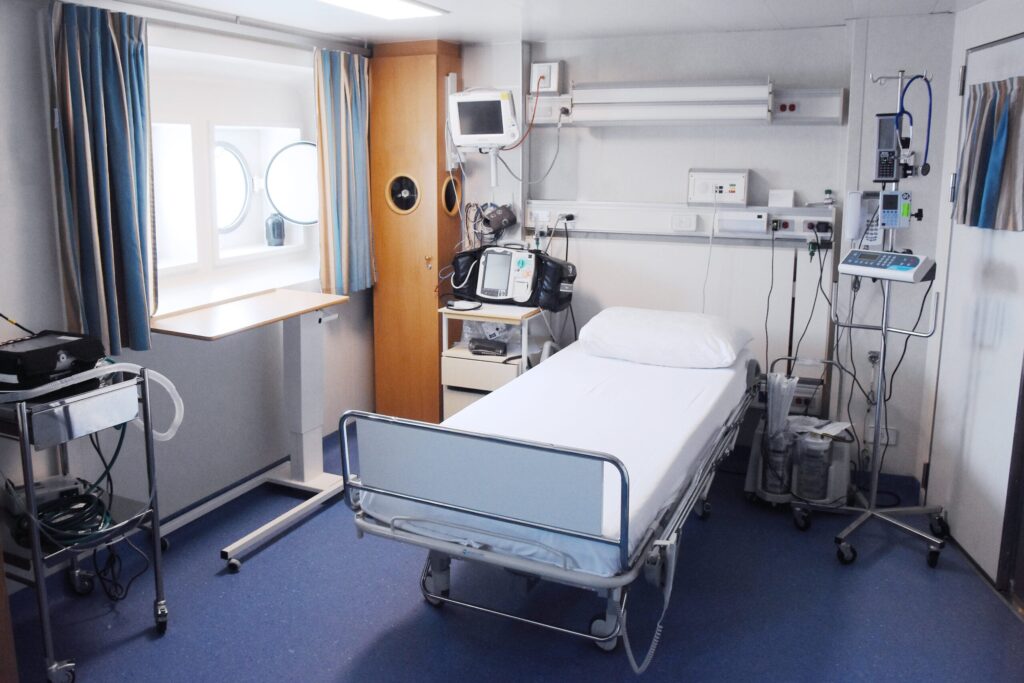If you’re planning a cruise vacation and have concerns about medical facilities on board, you’re not alone. It’s important to know what kind of medical care you can expect while at sea. Fortunately, cruise ships are equipped with medical facilities to handle a range of medical issues. From basic first aid to more complex procedures, these facilities are staffed by qualified medical professionals who are ready to assist you. In this article, we’ll explore what the medical facilities are like on a cruise ship, providing you with peace of mind as you embark on your adventure at sea.
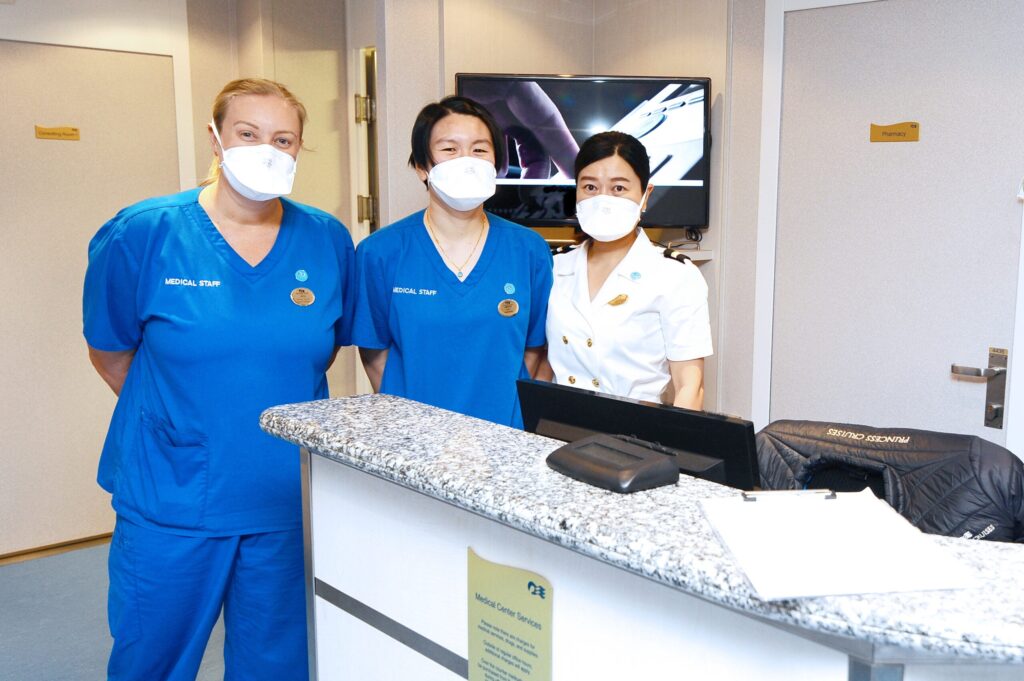
This image is property of thepointsguy.global.ssl.fastly.net.
Overview of Medical Facilities on Cruise Ships
Importance of Medical Facilities on Cruise Ships
When embarking on a cruise vacation, the health and safety of passengers should always be a top priority. The presence of fully-equipped medical facilities onboard cruise ships is vital to provide immediate medical attention to guests and crew members in case of emergencies or illnesses. These medical facilities play a crucial role in ensuring the well-being and peace of mind of everyone on board.
Types of Medical Staff on Cruise Ships
Cruise ships are equipped with highly trained and experienced medical professionals to cater to the medical needs of passengers and crew. Typically, there is a team of doctors and nurses onboard, ensuring that expert medical assistance is available 24/7. These medical staff members are well-versed in emergency medicine, general practice, and other specialized areas.
Availability of Medical Services
One of the key aspects of medical facilities on cruise ships is their availability throughout the journey. Regardless of the time of day or night, passengers can rely on the onboard medical team to provide immediate medical attention if required. From minor ailments to more serious medical emergencies, the medical staff is equipped to handle a wide range of medical conditions.
Emergency Medical Equipment
To effectively handle medical emergencies, cruise ships are equipped with advanced emergency medical equipment. This includes life-saving equipment such as defibrillators, ventilators, and cardiac monitoring devices, ensuring that immediate and appropriate care can be provided in critical situations. The presence of these essential medical devices enhances the ability of the medical staff to address emergencies promptly and efficiently.
Medical Staff and Services
Qualifications and Training
To ensure the highest quality of medical care on cruise ships, the medical staff undergo rigorous qualifications and training. Doctors and nurses are required to possess relevant certifications and have experience in emergency medicine, general practice, or other specialized areas. Additionally, continuous training and updates are provided to the medical team to keep their skills and knowledge up to date.
Role of Medical Staff
The medical staff on cruise ships have multiple roles and responsibilities. Apart from providing medical treatment and care, they also play an important role in promoting health and wellness. This includes conducting health screenings, offering advice on preventive measures, and promoting general well-being among passengers and crew members.
Scope of Medical Services
The medical services offered on cruise ships encompass a broad range of healthcare needs. From treating common illnesses and injuries to managing chronic conditions, the medical staff is fully equipped to handle a wide variety of medical situations. They can also provide vaccinations, prescribe medications, and assist with any necessary medical evacuations if required.
Availability of Medical Staff
The presence of medical staff on cruise ships is not limited to certain hours of the day. They are available round the clock to address any medical concerns that passengers or crew members may have. This ensures that everyone on board can receive immediate medical attention, regardless of the time or day.
Onboard Medical Center
Cruise ships have designated medical centers that serve as fully functioning medical facilities. These centers are equipped with examination rooms, a pharmacy, and other necessary medical equipment. The medical centers are designed to provide a comfortable environment for patients, ensuring their privacy and confidentiality throughout their visit.
Medical Facilities and Equipment
Medical Center Locations
Cruise ships are designed with conveniently located medical centers to ensure easy access for passengers and crew members. These centers are typically situated on lower decks, close to passenger cabins and crew quarters. The strategic placement of medical centers allows for quick response times in case of medical emergencies.
General Medical Facilities
The general medical facilities onboard cruise ships are comparable to those found in a small hospital or clinic. They are well-equipped to handle a wide range of medical conditions, including minor injuries, infections, and illnesses. The medical centers are staffed with skilled doctors and nurses who are trained to provide comprehensive medical care to patients.
Specialized Medical Facilities
In addition to general medical facilities, cruise ships also have specialized medical facilities to cater to specific medical needs. These specialty areas include dental clinics, radiology departments, and even operating rooms for minor surgical procedures. Having specialized facilities allows for more comprehensive medical care to be provided on board.
Diagnostic Equipment
Medical facilities on cruise ships are equipped with state-of-the-art diagnostic equipment to aid in the diagnosis and treatment of various medical conditions. This includes X-ray machines, ultrasound equipment, and laboratory facilities for conducting blood tests and other diagnostic procedures. The availability of such equipment enables medical staff to provide accurate and timely diagnoses.
Pharmacy and Medications
To ensure the availability of essential medications, cruise ship medical facilities also house onboard pharmacies. These pharmacies stock a wide range of prescription medications, over-the-counter drugs, and medical supplies. This enables passengers and crew members to obtain the necessary medications without having to disembark or seek external medical assistance.
Healthcare Costs and Insurance
Medical Charges and Fees
While onboard medical services are readily available, it’s important to note that there may be associated charges and fees. The costs can vary depending on the type of medical service required, ranging from routine medical consultations to more specialized treatments. Passengers should familiarize themselves with the fees and payment methods accepted on the cruise ship to ensure they are prepared for any potential medical expenses.
Insurance Coverage
Passengers are strongly encouraged to have adequate travel insurance that includes medical coverage. This is to ensure financial protection in the event of a medical emergency or illness during the cruise. Travel insurance can help cover the costs incurred for medical treatment, evacuation, and other related expenses, relieving passengers of any undue financial burden.
Claim Process
In the unfortunate event that medical services are required during a cruise, passengers will need to follow the insurance claim process outlined by their insurance provider. This typically involves providing relevant medical documentation and receipts for reimbursement purposes. It is advisable to familiarize yourself with the claim process and requirements before embarking on your cruise.
Onboard Medical Billing
Cruise ships often have a system in place to directly bill the passengers’ insurance providers for medical services rendered. This can streamline the process, allowing for faster resolution of medical bills. Passengers should inquire about the onboard billing procedures to ensure a smooth and hassle-free experience if medical services are needed.
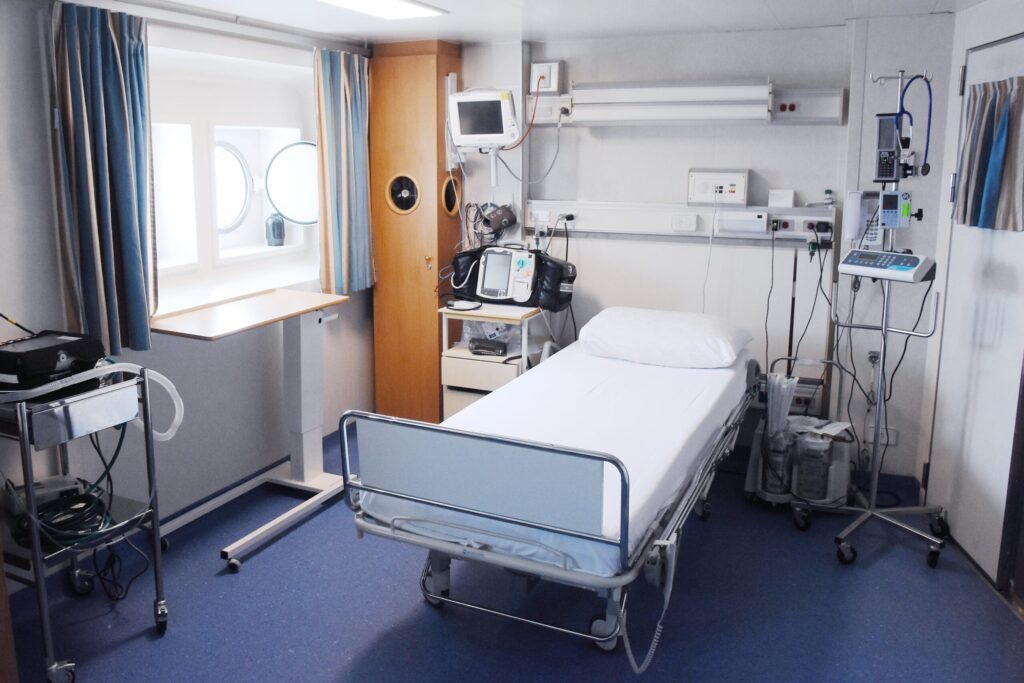
This image is property of thepointsguy.global.ssl.fastly.net.
Emergency and Evacuation Procedures
Emergency Response Plan
Cruise ships have well-defined emergency response plans in place to handle various critical situations effectively. This includes medical emergencies, natural disasters, fires, and other unforeseen events. The emergency response plan outlines the roles and responsibilities of the onboard personnel, including the medical staff, and ensures a coordinated and efficient response to emergencies.
Communication and Alert Systems
To facilitate emergency response, cruise ships are equipped with advanced communication and alert systems. These systems enable immediate communication between different areas of the ship and with the emergency response team. The medical staff can quickly communicate with relevant personnel and coordinate necessary medical interventions.
Emergency Drills
Safety drills, including medical emergency drills, are conducted regularly on cruise ships to ensure that both the crew and passengers are well-prepared in the event of an emergency. These drills familiarize everyone on board with emergency procedures, evacuation routes, and the proper use of safety equipment. Medical staff actively participate in these drills to ensure their readiness to handle emergencies.
Medical Evacuation
In situations where specialized medical care is required beyond the capabilities of the onboard medical facilities, cruise ships have established protocols for medical evacuation. This involves transferring the patient to a suitable onshore medical facility via helicopter, tender boats, or other means of transportation. Medical staff coordinate closely with these evacuation procedures to ensure the safe transfer and continuity of care.
Shore-based Medical Assistance
In some cases, shore-based medical assistance may be required for passengers or crew members. Cruise ships have established relationships with onshore medical facilities and emergency services to provide immediate assistance if needed. This ensures that passengers can access comprehensive medical care even when the ship is in port.
Cruise Line Policies and Guidelines
Cruise Line Medical Policies
Each cruise line has its own set of medical policies and guidelines that dictate the provision of medical services onboard. These policies outline the scope of medical care, insurance requirements, and passenger responsibilities. Familiarizing yourself with the cruise line’s medical policies can help ensure a clear understanding of the available medical services and expectations.
Reporting Illness or Injury
Passengers are encouraged to report any illnesses or injuries to the ship’s medical staff promptly. Early reporting allows for timely medical intervention and appropriate treatment. The medical staff can also provide guidance on any necessary precautions or restrictions to prevent the spread of contagious illnesses.
Quarantine Procedures
Cruise ships have established quarantine procedures in place to minimize the spread of contagious diseases onboard. This includes isolating individuals who may have been exposed to infectious illnesses or diseases. These procedures help maintain the overall health and safety of both passengers and crew members.
Health and Hygiene Measures
Cruise lines place significant emphasis on health and hygiene measures to prevent the spread of illnesses onboard. This includes regular cleaning and disinfection of public areas, hand sanitizer stations throughout the ship, and educational materials to promote proper hygiene practices. Passengers should actively participate in these measures to ensure the well-being of themselves and fellow passengers.
Preventive Measures
In addition to health and hygiene measures, cruise lines also provide preventive services to enhance passenger well-being. This may include onboard vaccination campaigns, health screenings, and educational programs on disease prevention. These proactive measures contribute to the overall health and safety of everyone on board.
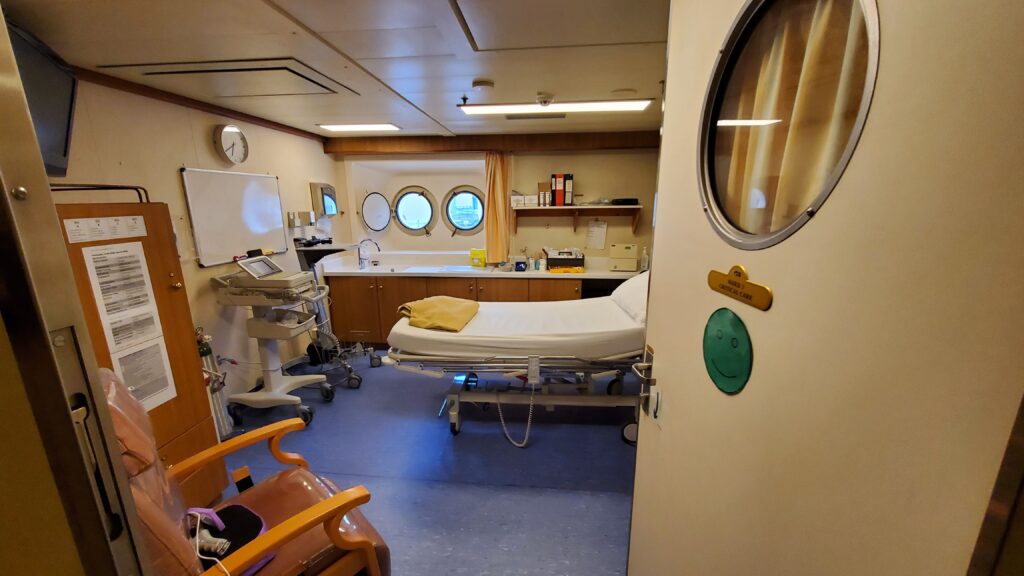
This image is property of www.usatoday.com.
Passenger Safety and Health Education
Safety Briefings
Cruise ships conduct mandatory safety briefings for all passengers at the beginning of the voyage. These briefings cover important safety information, including emergency procedures, evacuation routes, and the location of medical facilities. By attending these briefings, passengers can familiarize themselves with safety protocols and be prepared in the event of an emergency.
Health Education Programs
Promoting passenger health and well-being, cruise ships often offer health education programs during the voyage. These programs may include seminars, workshops, and activities focused on various health topics such as nutrition, fitness, stress management, and disease prevention. Participating in these programs allows passengers to gain valuable knowledge and adopt healthy habits.
Fitness and Wellness Activities
Cruise ships provide a wide range of fitness and wellness activities to cater to passengers’ well-being. These may include fitness classes, yoga sessions, spa treatments, and access to well-equipped fitness centers. Engaging in these activities promotes a healthy lifestyle and contributes to overall passenger satisfaction.
Disease Outbreak Prevention
Cruise ships adhere to strict protocols to prevent the outbreak and spread of diseases onboard. This involves routine cleaning and sanitation practices, monitoring of passenger health, and prompt response to any signs of illness. By implementing disease outbreak prevention measures, cruise lines strive to create a safe and healthy environment for all passengers.
Cruise Ship Medical Certifications
International Maritime Organization (IMO) Guidelines
The International Maritime Organization (IMO) has established guidelines to ensure that cruise ships meet certain medical standards. These guidelines cover various aspects, including the presence of medical personnel, medical equipment requirements, and emergency response procedures. Cruise ships complying with these guidelines demonstrate their commitment to passenger safety and well-being.
Medical Certificates for Crew
Cruise ship crew members are generally required to hold valid medical certificates to ensure their fitness to work onboard. These certificates confirm that crew members are in good health and meet the medical requirements mandated by the cruise line and regulatory authorities. Regular medical examinations and assessments may be conducted to maintain crew members’ medical fitness.
Medical Certificates for Passengers
While passengers are not generally required to provide medical certificates before boarding a cruise ship, it is advisable to disclose any pre-existing medical conditions or special needs at the time of booking. This allows the cruise line to better cater to specific medical requirements and make necessary accommodations if needed.
Medical Practitioner Accreditation
Medical facilities on cruise ships may undergo accreditation processes to ensure compliance with international medical standards. Accreditation agencies assess various aspects, including the qualifications of medical staff, availability and functionality of medical facilities, and adherence to emergency response protocols. Accreditation demonstrates the commitment to providing high-quality medical care on cruise ships.
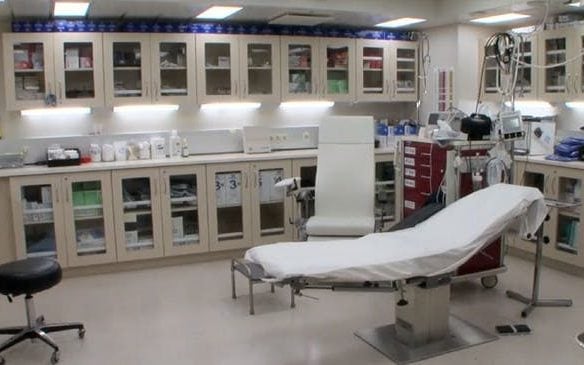
This image is property of www.telegraph.co.uk.
Communication and Collaboration
Medical Staff and Ship Personnel
Effective communication and collaboration between medical staff and other ship personnel are essential for the smooth operation of medical facilities. Close coordination ensures timely response to emergencies, proper maintenance of medical equipment, and seamless communication about passenger medical needs. This teamwork contributes to the overall efficiency and effectiveness of medical services onboard.
Coordination with Onshore Medical Facilities
Cruise ships establish coordination with onshore medical facilities to ensure the provision of comprehensive medical care. This collaboration allows for seamless transfers of patients requiring specialized medical attention beyond the capabilities of the onboard medical facilities. Medical staff work closely with onshore medical professionals to ensure a smooth transition and continuity of care.
Emergency Medical Assistance Providers
In critical situations, cruise ships may engage the services of emergency medical assistance providers. These providers offer expertise and resources to assist with medical evacuations, telemedicine consultations, and specialized medical interventions. These partnerships enable cruise ships to access additional medical support when necessary.
Telemedicine and Remote Medical Consultation
With advancements in technology, cruise ships may utilize telemedicine services to augment their onboard medical capabilities. Telemedicine allows for remote medical consultations with specialists, enabling access to expert advice even when the ship is at sea. The use of telemedicine enhances the quality of medical care available onboard and allows for timely medical interventions.
Passenger Expectations and Feedback
Guest Satisfaction with Medical Services
Cruise lines place great importance on guest satisfaction, including the medical services provided onboard. Continuous feedback is sought from passengers to gauge their experience and level of satisfaction with the medical facilities and services. This feedback helps cruise lines identify areas for improvement and ensure that passenger expectations are met or exceeded.
Medical Service Evaluations
Cruise ships conduct evaluations and assessments of their medical services to ensure the highest quality of care. This may involve regular performance evaluations of medical staff, monitoring patient outcomes, and reviewing feedback from passengers. By consistently evaluating medical services, cruise lines can enhance their medical facilities and meet the evolving needs of passengers.
Feedback Mechanisms
Cruise ships provide various feedback mechanisms for passengers to express their opinions and experiences with onboard medical services. These may include comment cards, online surveys, or direct communication channels with the cruise line’s customer service department. By actively seeking passenger feedback, cruise lines can make informed decisions and implement improvements as necessary.
Quality Improvement Measures
Continuous quality improvement is a priority for cruise ship medical facilities. Through regular audits and evaluations, areas for improvement can be identified, leading to the implementation of necessary measures. Medical staff participation in continuing education and training programs also facilitates ongoing improvement in medical care standards.
In conclusion, cruise ship medical facilities play a vital role in ensuring the health, safety, and well-being of passengers and crew members. With qualified medical staff, well-equipped medical centers, and the availability of emergency response measures, cruise ships are capable of providing comprehensive medical care. By adhering to international guidelines, collaborating with onshore medical facilities, and actively seeking passenger feedback, cruise lines continuously strive to enhance the quality of their medical services.
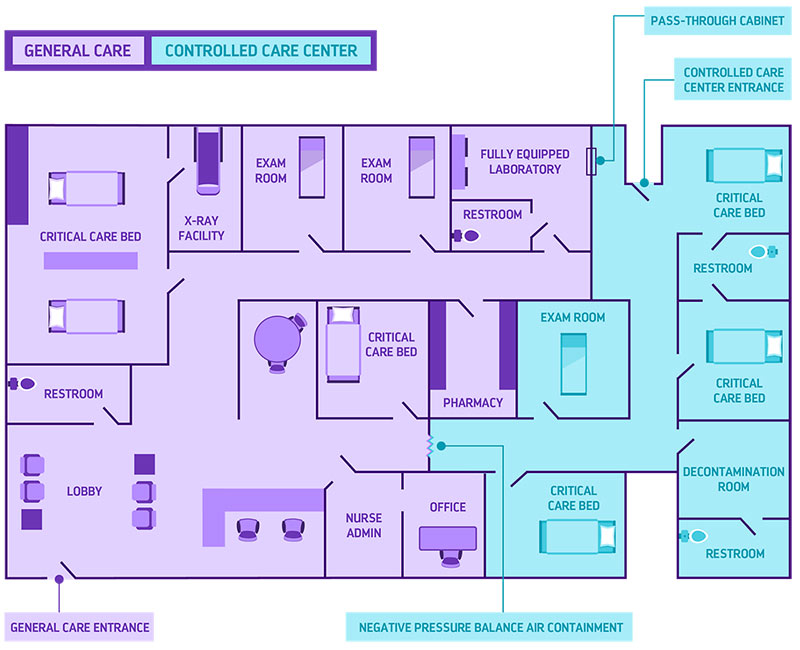
This image is property of cruiseindustrynews.com.
Hi, I'm Mike, the author of Ocean Bliss Journeys. As the captain of this incredible website, my mission is to provide you with the ultimate sailing experience. Set sail on a journey of discovery with us and indulge in the perfect mix of adventure and relaxation. Our handpicked cruises offer unparalleled luxury and unforgettable destinations. From romantic getaways to family vacations and hidden gem exploration, I've carefully curated tailored packages to ensure every moment is cherished. So, join me and embark on your dream cruise today. Let's create memories that will last a lifetime.

